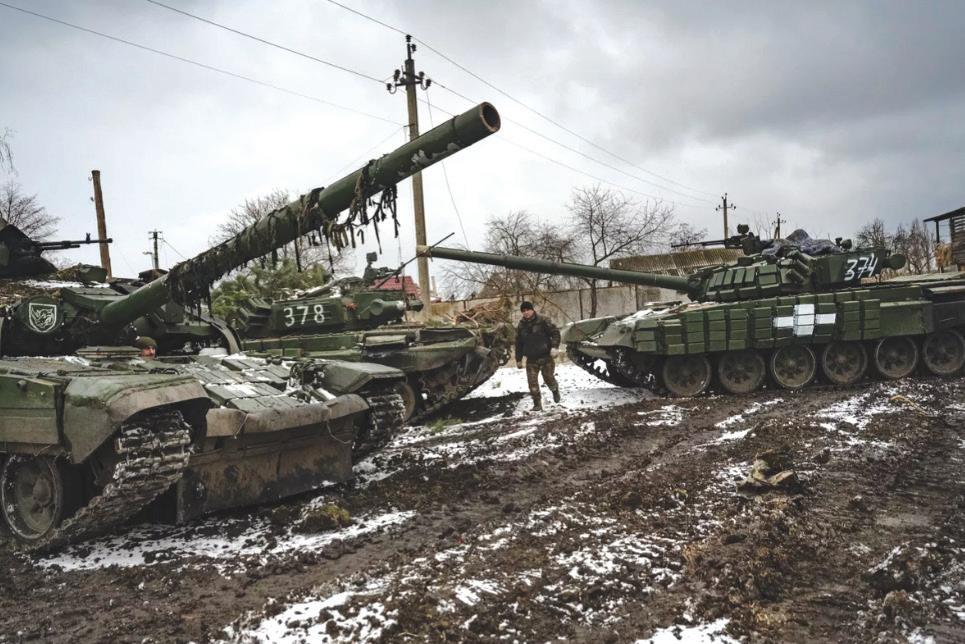
3 minute read
Moscow’s forces advance only a few hundred meters a week, UK says
By MARC SANTORA
As Russia makes slow, bloody gains in a renewed push to capture more of eastern Ukraine, it is pouring ever more conscripts and military supplies into the battle, Ukrainian officials say, although it remains far from clear that Moscow could mobilize enough forces to sustain a prolonged offensive.
Advertisement
The Ukrainian military said Tuesday that Russian forces were attacking in five different directions along the crescentshaped front line in the east, relying on masses of troops to try to overrun Ukrainian positions. The tactic has allowed Russia to make incremental gains in recent weeks and to slowly tighten a noose around the key Ukrainian-held city of Bakhmut, but at a cost of hundreds of dead and wounded soldiers each day, according to U.S. officials.
“The major threat is the quantity,” Serhiy Haidai, the Ukrainian governor of the eastern region of Luhansk, told Ukrainian television Tuesday. “It is a huge monster that is at war with us, and it owns immense resources — not endless, but still. There are too many of them.”
He said the day before that a “full-scale offensive” could begin after Feb. 15, as the Kremlin strains to show progress around the one-year mark of its invasion.
Ukraine’s military intelligence agency has been warning that Moscow plans to mobilize as many as half a million more soldiers to sustain its campaign. That would be “in addition to the 300,000 mobilized in October 2022,” Vadym Skibitsky, Ukraine’s deputy intelligence chief, wrote in a lengthy statement released Monday night assessing the state of the war.
But Western intelligence officials have questioned whether President Vladimir Putin of Russia could quickly find hundreds of thousands more soldiers without triggering a greater domestic backlash. The Kremlin is already struggling to train and arm the soldiers it does have, military analysts have said.
Britain’s defense intelligence agency said Tuesday that Russia had been trying to launch “major offensive operations” since early last month, with the aim of capturing the rest of the Donetsk region, which includes Bakhmut. But it had “only managed to gain several hundred meters of territory per week,” because of a lack of munitions and maneuver units, the agency said in its latest daily assessment of the war.
“It remains unlikely that Russia can build up the forces needed to substantially affect the outcome of the war within the coming weeks,” the agency concluded.
By EMMA BUBOLA
AChinese balloon floated over Latin America and the Caribbean, the Chinese government confirmed Monday, adding that it was for civilian purposes and was being used for flight tests.
“Affected by the weather and with limited self-steering capability, the airship deviated far from its planned course and entered into the airspace of Latin America and the Caribbean,” a spokesperson for China’s foreign ministry, Mao Ning, said at a news conference Monday.
On Friday morning, before the United States shot down a Chinese spy balloon that had spent the last week traversing the country, the Colombian National Air Defense System detected an object that had entered the northern part of the country’s airspace, the Colombian air force said in a statement.
Officials determined that the object had “characteristics similar to those of a balloon” and that it was flying at an altitude of over 55,000 feet and moving at an average speed of 25 knots.
On Saturday, the United States confirmed that a balloon was observed transiting Central and South America, and said that it was another Chinese surveillance balloon.
“These balloons are all part of a PRC fleet of balloons developed to conduct surveillance operations, which have also violated the sovereignty of other countries,” Brig. Gen. Patrick S. Ryder, the Pen- tagon’s press secretary, told reporters, referring to the People’s Republic of China.
The Colombian air force said it had tracked the object until it left the country’s airspace, adding that officials determined it did not pose a threat to national security and were investigating its origin.
On Sunday, the Venezuelan Ministry of Foreign Affairs, referring to the U.S. decision to shoot down the balloon Friday, said the government “rejects the attack by the United States against a civilian unmanned aircraft of Chinese origin.” In a statement, the Venezuelan government said: “Once again, the United States resorts to the use of force, instead of treating this situation with the seriousness and responsibility that the case deserves.”
President Nicolás Maduro of Venezuela has recently proposed establishing a new international bloc of Latin American and Caribbean countries and referred to Presidents Xi Jinping of China and Vladimir Putin of Russia as each being an “older brother.”
Mao said the Chinese government had informed relevant officials in other nations about the balloon flying over Latin America and that “they have expressed their understanding.”
The United States, Mao said, had “a clear overreaction.”










